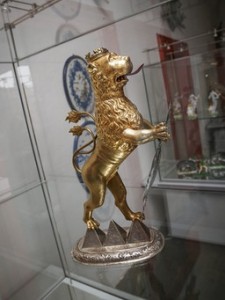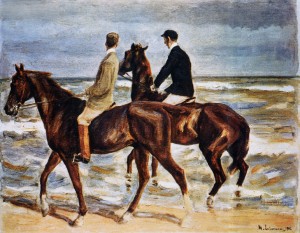I filed yesterday a new civil action against the Federal Republic of Germany and the Stiftung Preussischer Kulturbesitz (the SPK, which is responsible the administration of the Berlin museums, among other things) in the United States District Court in Washington, DC. You can read the Complaint here. The lawsuit seeks the immediate restitution to my clients of the collection held by the SPK known as the Welfenschatz, or as it is referred to in English, the Guelph Treasure. My clients Gerald Stiebel and Alan Phillip are the blood relatives and successors to the consortium of Jewish art dealers who were threatened and forced by the National Socialist government into selling the Welfenschatz in 1935.
Civil Action Filed Against Germany for Restitution of Guelph Treasure
Topics: Maria Altmann, National Socialists, Third Reich, Philipp v. Federal Republic of Germany et al. 15-c, United States Supreme Court, Gestapo, Foreign Sovereign Immunities Act, Markus Stoetzel, Mel Urbach, Nazis, Advisory Commission, Stiftung Preussischer Kulturbesitz, Washington DC, Hermann Goering, Restitution, Sullivan & Worcester LLP, Gerald Stiebel, World War II, flight tax, Adolf Hitler, United States District Court, Federal Republic of Germany, Alan Phillip, Welfenschatz
Sullivan & Worcester LLP Press Release Concerning Claims For Guelph Treasure
Topics: Maria Altmann, National Socialists, Third Reich, Philipp v. Federal Republic of Germany et al. 15-c, United States Supreme Court, Gestapo, Foreign Sovereign Immunities Act, Markus Stoetzel, Mel Urbach, Nazis, Advisory Commission, Stiftung Preussischer Kulturbesitz, Washington DC, Hermann Goering, Restitution, Sullivan & Worcester LLP, Gerald Stiebel, World War II, Foreign Sovereign Immunities, flight tax, Adolf Hitler, United States District Court, Federal Republic of Germany, Alan Phillip, Welfenschatz
Museums in Bamberg and Karlsruhe Recognize a Sale Under Duress For What it Was, Seek to Do Right Thing
Restitution policy at the federal and state level in Germany in recent months seems to have taken a certain direction that has been cause for criticism. Whether it is the recent decisions by the Limbach Commission that ignore longstanding law about sales under duress, the odd decision by the Federal Republic of Germany to resist a lawsuit over the Max Liebermann painting found in Cornelius Gurlitt’s apartment that the Gurlitt Task Force has already recommended be restituted, or the resistance to the claims by the Mendelssohn-Bartholdy heirs to Picasso’s Madame Soler, the trend has been towards obstruction and resistance rather than transparency and reconciliation. Notwithstanding the recent announcement of the Center for Cultural Property losses (the Deutsches Zentrum für Kulturgutverluste about which the jury is still out), this is cause for concern.
Topics: Katharina Siefert, Schwabinger Kunstfund, Cornelius Gurlitt, Karlsruhe Kunsthalle, Freien Kunst- und Ritterschießen, Badische Landesmuseum, Max Liebermann, Bamberg, Gurlitt Collection, Woman in a Theatre Balcony, Lothar Franz von Schönborn, Madame Soler, Schönborn’sche Löwenpokal, Heinrich and Emma Budge, Reich Ministry for Art- and Museum Objects, Schönborn Lion Cup, Restitution, Upper Franconia, Mendelssohn-Bartholdy, Mannheim, Karlsruhe, Free and Knightly Art of Shooting, World War II, Elector-Bishop, Kurfürst, Reichserziehungsministerium für Kunst- und Museums, Kurt Martin, www.lostart.de, Center for Cultural Property, Museums, Fürst-Bischof, Picasso, Federal Republic of Germany, Deutsches Zentrum für Kulturgutverluste, Limbach Commission, Oberfranken, Prince-Elector of Mainz
Toren Amends Complaint Against Bavaria Over Liebermann Seized from Gurlitt, Spotlights Task Force Recommendation of Restitution in Support of Bailment Theory
Two weeks ago, the Federal Republic of Germany and Bavaria moved to dismiss the restitution claims brought by David Toren over ownership of Two Riders on the Beach (Zwei Ritter am Strand) by the German painter Max Liebermann. Toren’s uncle David Friedmann owned the painting in Breslau before he was targeted for his collection and it was stolen. Toren had not seen it since adolescence. The painting is further notable for two (related) reasons: it is among the 1,280 works of art found in Cornelius Gurlitt’s apartment in 2012, and it is one of only two that the Gurlitt Task Force has recommended be restituted (to Toren). As we noted at the time of the motion, Germany’s tactics seemed odd; Bavaria has committed to complying with the Task Force’s recommendations, and contesting this case seems to make little sense. The likeliest reason, in our view, is to try to make some jurisdictional law that will weaken other potential claimants to the Gurlitt trove.
Topics: Schwabinger Kunstfund, Hildebrand Gurlitt, Cornelius Gurlitt, Breslau, Max Liebermann, Germany, Silesia, Gurlitt Collection, Foreign Sovereign Immunities Act, bailment, Entartete Kunst, FSIA, Restitution, Bavaria, David Toren, Zwei Ritter am Strand, Free State of Bavaria, 28 U.S.C. § 1605(a)(2), Looted Art, World War II, Foreign Sovereign Immunities, Altmann v. Republic of Austria, Freistaat Bayern, Kunstmuseum Bern, Riders on the Beach, Federal Republic of Germany, Raubkunst, David Friedmann, Münchner Kunstfund
Bavaria and Germany Move to Dismiss Gurlitt Litigation, But Raise Questions About Why They Are Resisting a Lawsuit Over Painting that Task Force Recommended They Restitute to David Toren
To date, only one lawsuit has been filed in the United States related to the seizure from Cornelius Gurlitt’s apartment of some 1,280 works of art, a story that broke a year ago with the concern about the objects’ Nazi-looting connections via his father Hildebrand Gurlitt (the view here last winter was that the longer Germany failed to address the situation comprehensively, the more likely such U.S. litigation became). That lawsuit, brought by David Toren, seeks the return of Two Riders on the Beach (Zwei Ritter am Strand), by Max Liebermann. Germany and Bavaria moved to dismiss the case yesterday, which is particularly puzzling given that among the very few determinations made by the Gurlitt Task Force (in August), it is that the Liebermann should be returned. The cynical view is that they are looking to forestall future claims, but it is past time for the painting to be returned.
Topics: Schwabinger Kunstfund, Hildebrand Gurlitt, Cornelius Gurlitt, Breslau, Max Liebermann, Germany, Silesia, Gurlitt Collection, Foreign Sovereign Immunities Act, bailment, Entartete Kunst, FSIA, Restitution, Bavaria, David Toren, Zwei Ritter am Meer, Free State of Bavaria, 28 U.S.C. § 1605(a)(2), Looted Art, World War II, Altmann v. Republic of Austria, Freistaat Bayern, Kunstmuseum Bern, Riders on the Beach, Federal Republic of Germany, Raubkunst, David Friedmann, Münchner Kunstfund
Limbach Commission Rules Against Claimants to Restitution of “Three Graces” by Lovis Corinth in Unpersuasive Opinion
The German Advisory Commission for the Return of Cultural Property Seized as a Result of Nazi Persecution, Especially Jewish Property (Beratende Kommission) has issued its latest decision concerning allegedly Nazi-looted art in German museums. For the second case in a row after the widely (and wisely) derided opinion not to restitute the Welfenschatz or Guelph Treasure at the Stiftung Preussischer Kulturbesitz in Berlin, the commission (known for its presiding member, former German Supreme Constitutional Court judge Jutta Limbach) has recommended against restitution, this time over the claim by heirs of Clara Levy to The Three Graces (Drei Grazien) by Lovis Corinth (1902/1904). The decision (available only in German) is riddled with poor logic and basic historical errors. In short, while it may be that the painting was indeed delivered to Clara Levy’s daughter in the United States at Clark’s express instruction, that is far less clear than the commission states, and its decision further makes a number of assumptions about the circumstances of Jews in occupied or about-to-be occupied territories that undermine its credibility considerably.
Topics: Berlin, Else Bergmann, Schleifmühle, Hildebrand Gurlitt, Cornelius Gurlitt, Ludwig Levy, Fritz Levy, Rita Hubbard, Germany, Nazi-looted art, bill of lading, Especially Jewish Property, Buchholz Gallery, Madame Soler, German Advisory Commission for the Return of Cultu, San Francisco, Entartete Kunst, Beratende Kommission, Stiftung Preussischer Kulturbesitz, FSIA, Curt Valentin, expropriation exception”, Gurlitt, Restitution, Max Huggler, Mendelssohn-Bartholdy, Clara Levy, Sigfried Rosengart, Luxembourg, Henry Zacharias, Compagnie Generale Transatlantique Hol Lesquette, World War II, Foreign Sovereign Immunities, Pinakothek der Moderne, degenerate art, beschlagnahmte Kunst, Jutta Limbach, Kunstmuseum Bern, Drei Grazien, Pablo Picasso, Lovis Corinth, Museums, Three Graces, Bavarian State Painting Collections, Federal Republic of Germany, Paula Levy, Kurt Buchholz, Welfenschatz, Limbach Commission, New York, Bayerische Staatsgemäldesammlungen
Claims by Mendelssohn Bartholdy Heirs over Picasso "Madame Soler" Dismissed, Court Finds No FSIA Jurisdiction After Evidentiary Hearings
The U.S. District Court for the Southern District of New York has dismissed claims for ownership of Madame Soler by Pablo Picasso, currently at the Pinakothek der Moderne in Munich. Just as the relevance of Judge Jed Rakoff’s comments over another art restitution case brought by the heirs of Paul von Mendelssohn Bartholdy unexpectedly came to the fore recently, Judge Rakoff’s decision is now the most recent in a line of frustrations for the heirs of Mendelssohn Bartholdy, a victim of Nazi persecution in Berlin in the 1930s. The ramifications of this case may be fairly narrow, however, as the case was premised on allegations of specific transactions in New York rather than general allegations about the conduct of Germany. The claimants could appeal, or perhaps turn to the Limbach Commission if they could be heard (the Pinakothek is a subdivision of Germany for jurisdictional analysis, but it’s unclear at first blush if the Commission would view this claim as within its province).
Topics: Paul von Mendelssohn Bartholdy, Berlin, commercial activity exception, Cornelius Gurlitt, Florence Kesselstatt, Judge Jed Rakoff, Halldor Soehner, Saint-Jean-Cap-Ferrat, Julius Schoeps, Upper East Side, Prussia, Max Liebermann, Night Café, Gurlitt Collection, Foreign Sovereign Immunities Act, Preussen, France, State Paintings Collection, Madame Soler, Museum of Modern Art, Edelgard von Lavergne-Peguilhen, Van Gogh, Munich, Justin K. Thannhauser, FSIA, expropriation exception”, Nazi persecution, Boy Leading a Horse, Restitution, David Toren, Bayerische Staatsgemäldesammlung, Bavarian State Ministry for Education and Culture, Free State of Bavaria, World War II, Foreign Sovereign Immunities, Pinakothek der Moderne, Bayerisches Staatsministerium für Bildung und Kult, Bundesländer, Altmann v. Republic of Austria, Freistaat Bayern, Le Moulin de la Galette, Kurt Martin, München, Pablo Picasso, Federal Republic of Germany, Limbach Commission, Wissenschaft und Kunst
Foreign Cultural Exchange Jurisdictional Immunity Clarification Act Reintroduced in House of Representatives, Would Ban Use of Exhibition Loan as Basis for Federal Court Jurisdiction
Steve Chabot (R-OH) has reintroduced the Foreign Cultural Exchange Jurisdictional Immunity Clarification Act (H.R. 4292), after a previous attempt to amend the Foreign Sovereign Immunities Act with regard to the loan of cultural objects failed to become law in 2012. The text of the March 25, 2014 bill is identical to the version that passed in the House in 2012. Its co-sponsors are John Conyers (D-MI) and Bob Goodlatte (R-VA), and it has been referred to the House Judiciary Committee.
Topics: Cornelius Gurlitt, Malewicz v. City of Amsterdam, Girolamo Romano, Gurlitt Collection, 22 U.S.C. § 2459, Christ Carrying the Cross Dragged by a Rogue, 517 F.Supp.2d 322, FSIA, Restitution, David Toren, 19 U.S.C. § 1595a, Steve Chabot, Orrin Hatch, House Judiciary Committee, 28 U.S.C. § 1605(a)(2), 28 U.S.C. § 1605(a)(3), Senate Bill 2212, World War II, IFSA, Foreign Sovereign Immunities, Altmann v. Republic of Austria, Portrait of Wally, John Conyers, Immunity from Seizure Act, Dianne Feinstein Foreign Sovereign Immunities Act, Federal Republic of Germany, 28 U.S.C. § 1605, H.R. 4292, Foreign Cultural Exchange Jurisdictional Immunity
Germany Itself Exhibited in the United States Dozens of Works from Hildebrandt Gurlitt in 1956
There have been occasional references during the Gurlitt affair to the possiblity that some of the paintings seized from Hildebrand Gurlitt's apartment had been exhibited in the United States. Details have been sparse. With a copy of the out-of-print catalogue from that exhibition now in hand, however, we can start to identify the scope of this U.S. contact—and thus the basis for possible claims against Gurlitt and/or the Federal Republic of Germany by those paintings' original owners or heirs. Until the disclosures by the Gurlitt Task Force are complete, it remains to be seen which.
Topics: Schwabinger Kunstfund, Max Beckmann. www.lostart.de, Lempertz, Cornelius Gurlitt, Nolde, Gurlitt Task Force, Art Association for the Rhineland and Westphalia, Gurlitt Collection, Lion Tamer, Hildebrandt Gurlitt, Entartete Kunst, Restitution, Kirchner, Kandinsky, World War II, German Watercolors Drawings and Prints, Löwenbändiger, Kunstverein Düsseldorf, A Loan Exhibition Sponsored by the Federal Republi, Franz Marc, Large Horse, Federal Republic of Germany, Raubkunst, Zandvoordt






